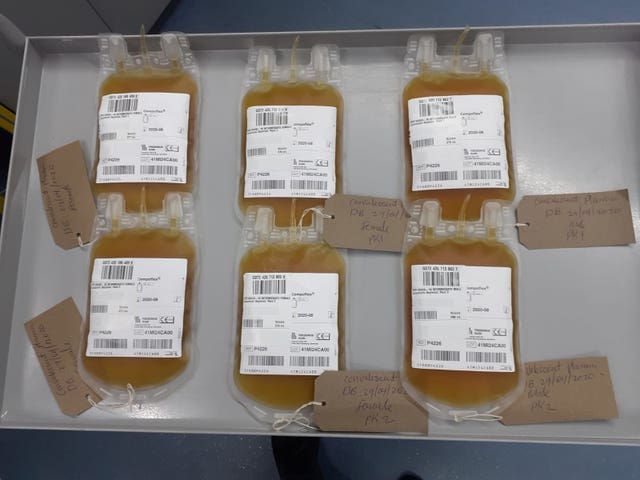First patients given plasma in coronavirus treatment trial
Hospitals in London and Birmingham have been supplied with fourteen units of convalescent plasma to see if it helps people who are battling Covid-19.

The first patients have been given plasma donated by people who have recovered from coronavirus in a trial for a possible treatment.
Fourteen units of convalescent plasma have been supplied to hospitals in London and Birmingham in the hope they can help people battling the illness by improving their speed of recovery and chances of survival.
The effectiveness of such transfusions in patients who are struggling to develop an immune response is still being assessed but the NHS has been ramping up collection of the plasma since the clinical trial was approved almost two weeks ago.
The health service is aiming to be in a position to roll out the treatment widely if it proves successful and NHS Blood and Transplant (NHSBT) has collected more than 400 donations so far.
The first units have been supplied to Guy’s and St Thomas’ NHS Foundation Trust, Imperial College Healthcare NHS Trust and University Hospitals Birmingham NHS Foundation Trust.
Not all 14 units have been transfused yet, NHSBT said.
Dr Gail Miflin, NHSBT chief medical officer, said: “We’re delighted the first patients are receiving convalescent plasma transfusions thanks to the generosity of our donors.”
She added: “We’re rapidly building collection capacity so that if our trial shows the transfusions are effective, we can supply hospitals at a large scale.
“We are collecting in nine cities at the moment and we’re expanding to all 23 of our donor centres, and some new venues in large cities.”

Potential donors – people who have recovered from a confirmed case of coronavirus – are being proactively contacted by NHSBT if they live near a donor centre, but others can give their details at nhsbt.nhs.uk.
Plasma will only be taken after someone has had at least 28 days to recover and therefore hopefully developed a good antibody response.
The first transfusions are being done as part of the ongoing international REMAP-CAP trial, which has been designed to find answers about what the best treatment options might be for those most seriously ill with Covid-19.
Professor Anthony Gordon, from Imperial College London, who is the chief investigator for the REMAP-CAP trial, said: “It is fully adaptive, meaning that new treatments can be added as we learn more, the sample size isn’t fixed and it keeps recruiting until it finds that a treatment is better, worse, or the same as another.
“It also ‘learns’ from that data so that patients are more likely to receive those interventions that are performing best.”
Chest doctor Abhi Lal said it was “fantastic” to be able to try and help others by donating his plasma at Birmingham Donor Centre.
The 43-year-old from Solihull said: “I had Covid-19 six weeks ago. I had body aches, fever and fatigue, and a positive test result.
“I wanted to do something to potentially help others and to help develop a treatment.
“I am a chest doctor at Worcestershire Acute Hospitals NHS Trust. I look after people at the severe end of it. It’s been a pretty nasty illness.
“It’s made a lot of people very ill and unfortunately some people have not survived. It’s good to be able to try help by donating plasma too.”





